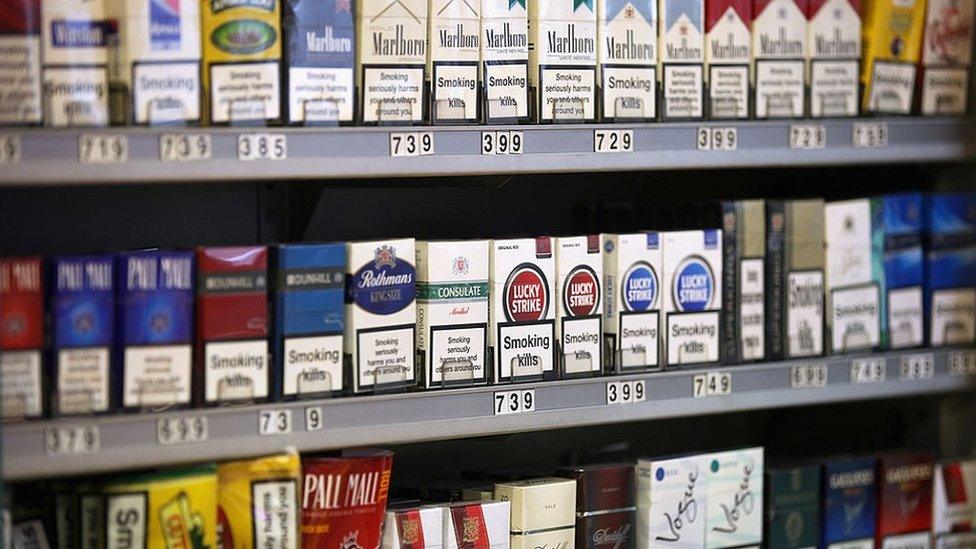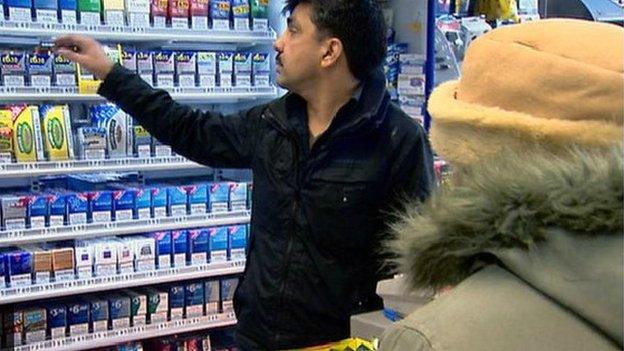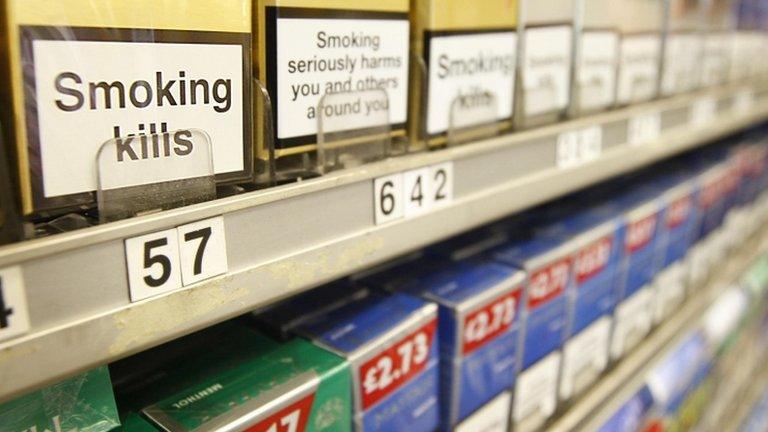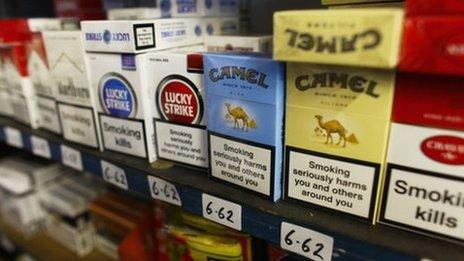Tobacco display ban 'safeguards young people'
- Published

Cigarettes were on public display at till points in stores until about 2015
A ban on displaying cigarettes and tobacco at shop counters has reduced the risk of young people taking up smoking, according to a new study.
Tobacco products have been hidden from point-of-sale displays across the UK for more than four years.
University of Stirling researchers said their study showed the ban "helps safeguard young people".
Lead author Dr Allison Ford added: "Our findings help to justify this policy approach in the UK and elsewhere."
She said it was the first study to examine the impact of the tobacco display ban before, during and after its implementation.
What is the law on tobacco displays?

Tobacco products are now hidden from view by curtains or sliding doors
Displays of tobacco products at shop counters were first banned in larger stores in England in April 2012.
Ministers said that by removing cigarettes from view, it would help curb the number of young people taking up smoking.
Similar laws came into effect in Wales and Northern Ireland later that year, and in Scotland in April 2013.
A full ban, which also affected small shops, came into force across the UK in April 2015.
The law stipulates tobacco products must be completely covered from view.
It does not say how units should be covered, but most retailers using sliding doors or hanging covers.
How has it affected young people?
The latest research from the University of Stirling examined the impact of the policy on 11-16-year-olds who had never smoked.
Dr Ford's team interviewed a total of 3,791 young people, including 2,953 who had never smoked, before, during and after the law was introduced.
She said: "Prior to the display ban, we found that young 'never smokers' who noticed cigarettes displayed at point-of-sale, and those who were aware of more cigarette brands, were more likely to indicate being susceptible to smoking.
"Both partial and full implementation of the display ban were followed by statistically significant reductions in youth smoking susceptibility and noticing cigarettes at point-of-sale."
Among their findings, they discovered that:
The "smoking susceptibility" of children who had never smoked decreased from 28% pre-ban to 18% post-ban
A total of 81% of those interviewed noticed cigarettes at point-of-sale before the law came into force, compared to 28% afterwards
The average number of cigarette brands recalled by the children declined from 0.97 to 0.69
After the ban was fully implemented, 90% of those who have never smoked supported the display ban
It made cigarettes seem unappealing, according to 77% of those interviewed
And 87% said it made smoking seem unacceptable

Dr Allison Ford led the research into the impact of the tobacco display ban
What's the reaction to the findings?
The research, which has been published in the British Medical Journal's Tobacco Control, was funded by Cancer Research UK.
Its tobacco control manager, Kruti Shrotri, said the findings proved the laws had made a difference to public health.
She said: "Glitzy displays and glamorous packaging helped the tobacco industry to lure the next generation of smokers into taking up a deadly addiction.
"But contrary to Big Tobacco's belief that banning displays would make no difference this study shows that by putting cigarettes out of sight and out of mind far fewer youngsters are taking up the deathly habit."
Duncan Selbie, chief executive of Public Health England, said: "Banning the display of tobacco products at point-of-sale has worked and it's fabulous that more young people are now turning their backs on smoking, literally saving thousands of lives."

The Scottish government said it had invested £10m annually over the last five years in stop-smoking services.
"Since 2010 Scotland has seen the largest decline in the proportion of smokers across the UK," a spokesman added.
However, smokers's group Forest said children should be educated about the health risks of smoking, rather than hiding tobacco products.
Its director Simon Clark said: "Smoking rates among young teenagers were falling long before the display ban so it's hardly surprising that children's susceptibility to smoking continued to fall during and after the implementation of the ban because that was the long-term trend."
He added: "We support reasonable measures that discourage children from smoking but hiding a legal consumer product infantilises everyone and sets an unwelcome precedent for other potentially harmful products."
- Published1 July 2017
- Published6 April 2015

- Published12 December 2012

- Published6 April 2015
